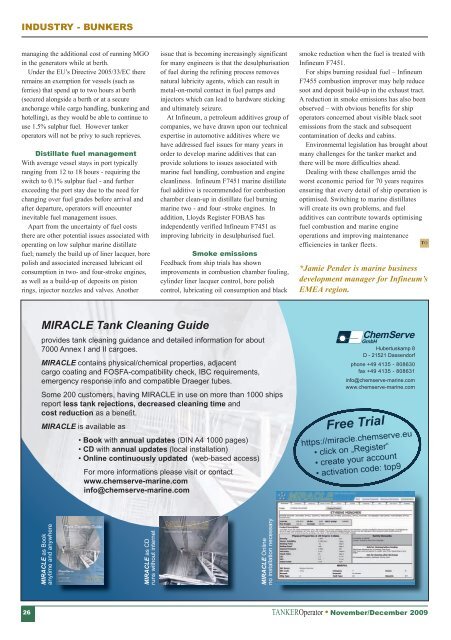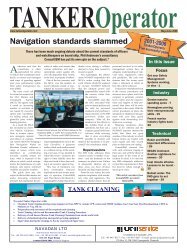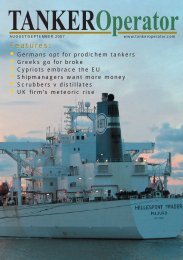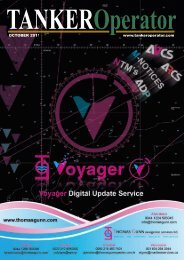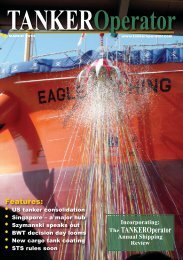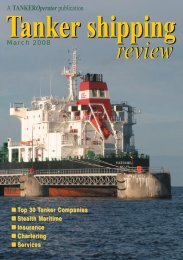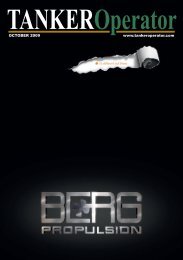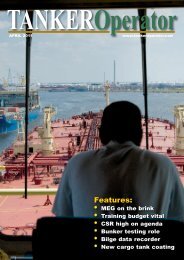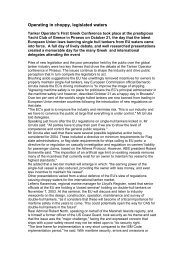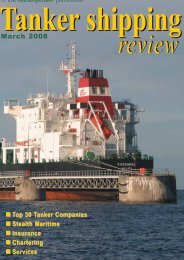Features: - Tanker Operator
Features: - Tanker Operator
Features: - Tanker Operator
Create successful ePaper yourself
Turn your PDF publications into a flip-book with our unique Google optimized e-Paper software.
INDUSTRY - BUNKERS<br />
managing the additional cost of running MGO<br />
in the generators while at berth.<br />
Under the EU’s Directive 2005/33/EC there<br />
remains an exemption for vessels (such as<br />
ferries) that spend up to two hours at berth<br />
(secured alongside a berth or at a secure<br />
anchorage while cargo handling, bunkering and<br />
hotelling), as they would be able to continue to<br />
use 1.5% sulphur fuel. However tanker<br />
operators will not be privy to such reprieves.<br />
Distillate fuel management<br />
With average vessel stays in port typically<br />
ranging from 12 to 18 hours - requiring the<br />
switch to 0.1% sulphur fuel - and further<br />
exceeding the port stay due to the need for<br />
changing over fuel grades before arrival and<br />
after departure, operators will encounter<br />
inevitable fuel management issues.<br />
Apart from the uncertainty of fuel costs<br />
there are other potential issues associated with<br />
operating on low sulphur marine distillate<br />
fuel; namely the build up of liner lacquer, bore<br />
polish and associated increased lubricant oil<br />
consumption in two- and four-stroke engines,<br />
as well as a build-up of deposits on piston<br />
rings, injector nozzles and valves. Another<br />
issue that is becoming increasingly significant<br />
for many engineers is that the desulphurisation<br />
of fuel during the refining process removes<br />
natural lubricity agents, which can result in<br />
metal-on-metal contact in fuel pumps and<br />
injectors which can lead to hardware sticking<br />
and ultimately seizure.<br />
At Infineum, a petroleum additives group of<br />
companies, we have drawn upon our technical<br />
expertise in automotive additives where we<br />
have addressed fuel issues for many years in<br />
order to develop marine additives that can<br />
provide solutions to issues associated with<br />
marine fuel handling, combustion and engine<br />
cleanliness. Infineum F7451 marine distillate<br />
fuel additive is recommended for combustion<br />
chamber clean-up in distillate fuel burning<br />
marine two - and four -stroke engines. In<br />
addition, Lloyds Register FOBAS has<br />
independently verified Infineum F7451 as<br />
improving lubricity in desulphurised fuel.<br />
Smoke emissions<br />
Feedback from ship trials has shown<br />
improvements in combustion chamber fouling,<br />
cylinder liner lacquer control, bore polish<br />
control, lubricating oil consumption and black<br />
smoke reduction when the fuel is treated with<br />
Infineum F7451.<br />
For ships burning residual fuel – Infineum<br />
F7455 combustion improver may help reduce<br />
soot and deposit build-up in the exhaust tract.<br />
A reduction in smoke emissions has also been<br />
observed – with obvious benefits for ship<br />
operators concerned about visible black soot<br />
emissions from the stack and subsequent<br />
contamination of decks and cabins.<br />
Environmental legislation has brought about<br />
many challenges for the tanker market and<br />
there will be more difficulties ahead.<br />
Dealing with these challenges amid the<br />
worst economic period for 70 years requires<br />
ensuring that every detail of ship operation is<br />
optimised. Switching to marine distillates<br />
will create its own problems, and fuel<br />
additives can contribute towards optimising<br />
fuel combustion and marine engine<br />
operations and improving maintenance<br />
TO<br />
efficiencies in tanker fleets.<br />
*Jamie Pender is marine business<br />
development manager for Infineum’s<br />
EMEA region.<br />
MIRACLE Tank Cleaning Guide<br />
provides tank cleaning guidance and detailed information for about<br />
7000 Annex I and II cargoes.<br />
MIRACLE contains physical/chemical properties, adjacent<br />
cargo coating and FOSFA-compatibility check, IBC requirements,<br />
emergency response info and compatible Draeger tubes.<br />
Some 200 customers, having MIRACLE in use on more than 1000 ships<br />
report less tank rejections, decreased cleaning time and<br />
cost reduction as a benefit.<br />
MIRACLE is available as<br />
• Book with annual updates (DIN A4 1000 pages)<br />
• CD with annual updates (local installation)<br />
• Online continuously updated (web-based access)<br />
For more informations please visit or contact<br />
www.chemserve-marine.com<br />
info@chemserve-marine.com<br />
Hubertuskamp 8<br />
D - 21521 Dassendorf<br />
phone +49 4135 - 808630<br />
fax +49 4135 - 808631<br />
info@chemserve-marine.com<br />
www.chemserve-marine.com<br />
MIRACLE as Book<br />
anytime and anywhere<br />
MIRACLE as CD<br />
runs without internet<br />
MIRACLE Online<br />
no installation necessary<br />
26<br />
TANKER<strong>Operator</strong> November/December 2009


